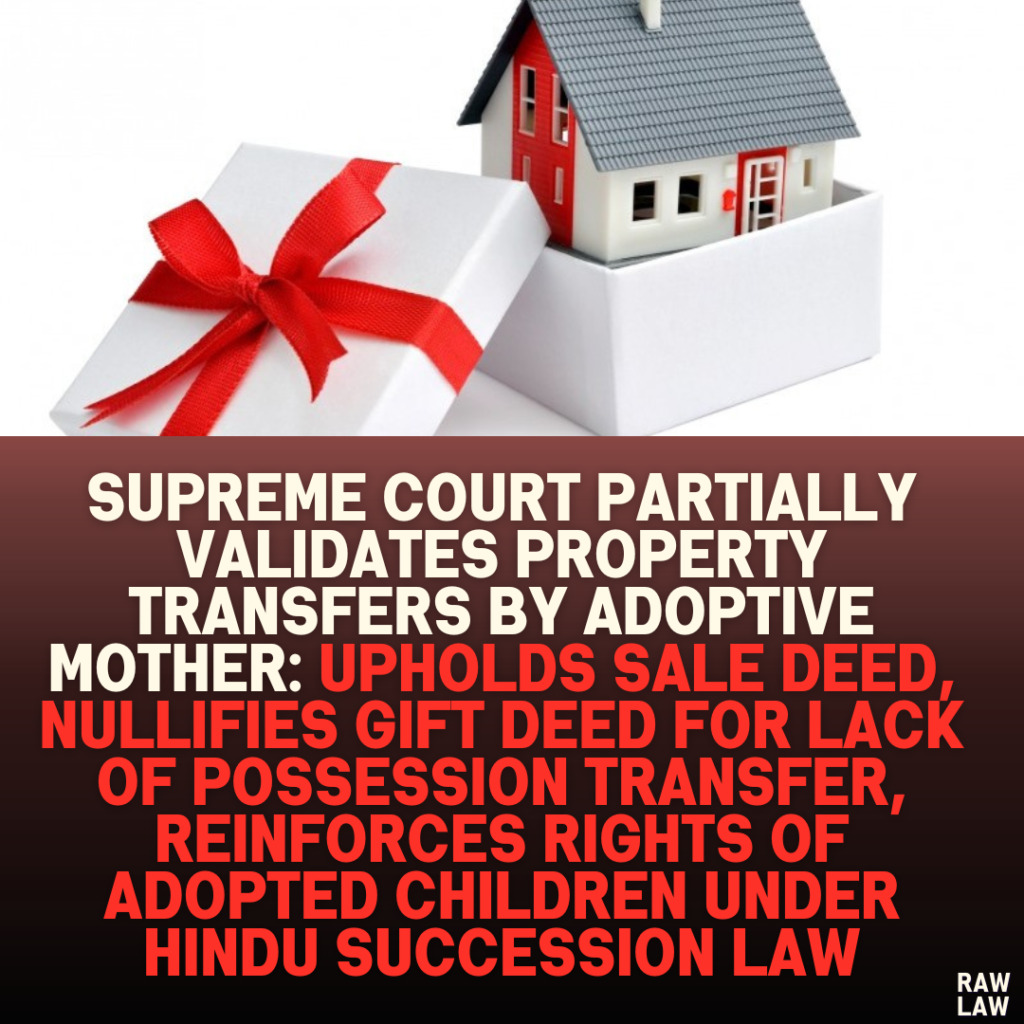Court’s Decision:
The Supreme Court partially allowed the appeal:
- Sale Deed: The sale deed executed by the adoptive mother in 2007 was upheld as valid.
- Gift Deed: The gift deed executed in 2008 was declared null and void. The Court restored the trial court’s decision, entitling the appellant (adoptive son) to the properties listed in schedules ‘B’ and ‘C.’
Facts:
- Ownership of Properties: The original owner of the properties, Bhavakanna Shahapurkar, had two wives and children through the second wife. After his death, his properties were partitioned through legal decrees.
- Adoption: The appellant was adopted by Bhavakanna’s first wife, Parvatibai, in 1994. The adoption deed was registered and undisputed.
- Disputed Alienations:
- In 2007, Parvatibai executed a sale deed transferring part of the properties (schedule ‘A’) to respondents.
- In 2008, she executed a gift deed transferring properties (schedules ‘B’ and ‘C’) to other respondents.
- Legal Challenge: The appellant claimed these alienations were invalid as they occurred without his consent, asserting that as an adopted son, he had inherited half of the properties.
Issues:
- Did the appellant acquire a legal right to a half share in the suit properties through adoption?
- Was Parvatibai competent to execute the sale deed and gift deed without the appellant’s consent?
- Were the sale and gift deeds valid under Hindu law and related property laws?
Petitioner’s Arguments:
- Inheritance Claim: The appellant argued that as the adopted son, his rights as a legal heir were vested upon adoption, and he was entitled to half the share in the properties.
- Alienation Challenge: He contended that the sale and gift deeds executed by Parvatibai were invalid, as they infringed upon his rights as a co-owner.
Respondent’s Arguments:
- Absolute Ownership: The respondents argued that Parvatibai had absolute ownership over the properties under Section 14(1) of the Hindu Succession Act, enabling her to execute the deeds.
- Binding Deeds: They maintained that the sale and gift deeds were lawful and binding, as they were executed in compliance with statutory requirements.
Analysis of the Law:
- Section 14(1), Hindu Succession Act: Grants absolute ownership to a female Hindu over any property possessed by her, irrespective of how she acquired it. This includes property received via partition decrees, as was the case here.
- Section 12(c), Hindu Adoptions and Maintenance Act: Prevents an adopted child from divesting rights over properties that were already alienated before adoption.
- Doctrine of Relation Back: Adoption by a widow relates back to the date of her husband’s death, conferring inheritance rights on the adopted child as if they were born at the time of the father’s death. However, this principle does not nullify lawful alienations made by the widow prior to the adoption.
- Section 122, Transfer of Property Act: Requires a valid gift deed to be accompanied by delivery of possession of the gifted property to the donees.
Precedent Analysis:
- Kasabai Tukaram Karwar v. Nivruti: Affirmed that lawful alienations made by a widow prior to adoption bind the adopted child.
- Mst. Deu v. Laxmi Narayan: Established the presumption of validity for registered adoption deeds unless disproved with strong evidence.
Court’s Reasoning:
- Sale Deed:
- The sale deed (2007) was executed after Parvatibai had acquired absolute ownership of the properties under a compromise decree from earlier litigation.
- The Court held that the appellant’s rights as an adopted son could not override lawful alienations made prior to the adoption.
- The sale followed due procedures, and the consideration was received, making it binding.
- Gift Deed:
- The gift deed (2008) was invalid due to lack of possession transfer, a key requirement under Section 122 of the Transfer of Property Act.
- Testimonies revealed that the gifted properties remained in Parvatibai’s possession until her death, and the donees never assumed possession.
- The trial court’s detailed findings on this issue were sound and were wrongly reversed by the High Court without adequate reasoning.
- Adoption Rights:
- While adoption confers inheritance rights retrospectively under the Doctrine of Relation Back, these rights are subject to alienations made by the adoptive parent before adoption.
- The Court applied this principle to validate the sale deed but struck down the gift deed due to procedural non-compliance.
Conclusion:
- The sale deed executed in 2007 was upheld, confirming that the appellant had no share in the schedule ‘A’ property.
- The gift deed executed in 2008 was declared null and void, reinstating the trial court’s judgment that the appellant was entitled to the schedule ‘B’ and ‘C’ properties as the sole legal heir.
Implications:
- The judgment reinforces the absolute ownership rights of female Hindus under the Hindu Succession Act.
- It highlights the limitations of the Doctrine of Relation Back, ensuring it does not retroactively invalidate lawful transactions.
- The case underscores the importance of possession transfer for the validity of gift deeds.
Also Read –
Posted inNews




Pingback: Rajasthan High Court Directs Continuity of Service Until 62 Years for Ayurvedic Department Employees: Orders Pension Refixation, Arrears, and Compliance with Supreme Court-Affirmed Precedents - Raw Law
Pingback: Delhi High Court: "Technical Glitch in Registrar of Trademarks' Portal Cannot Deprive Statutory Rights" – Quashes Rejection of Trademark Opposition and Directs Registrar to Accept Notice - Raw Law